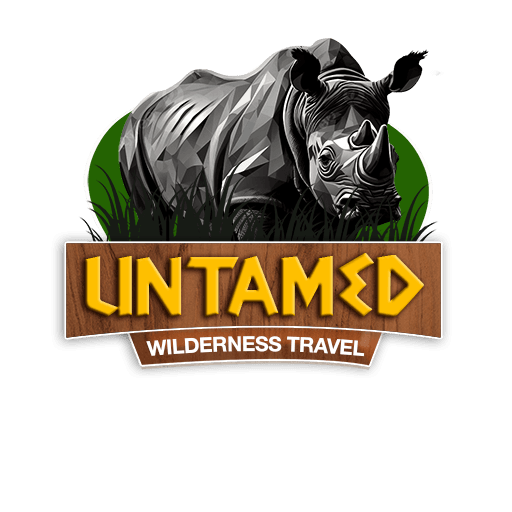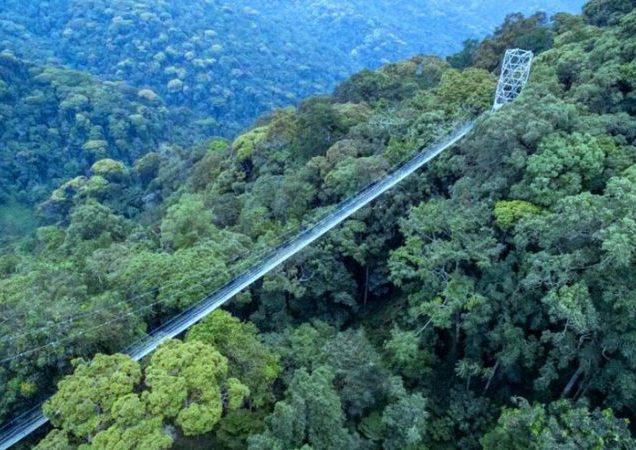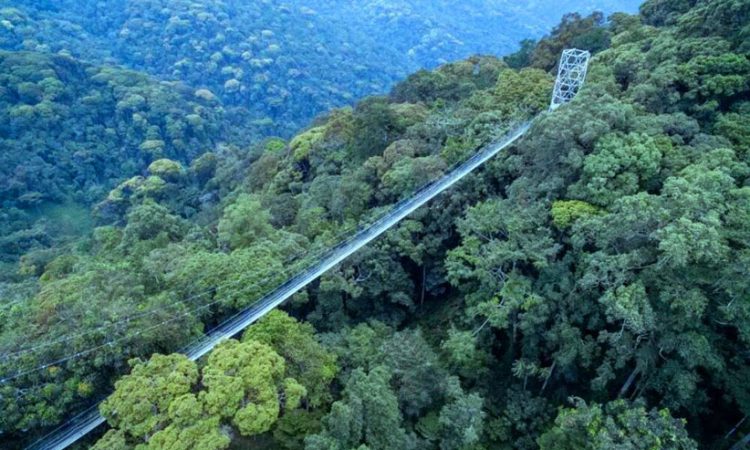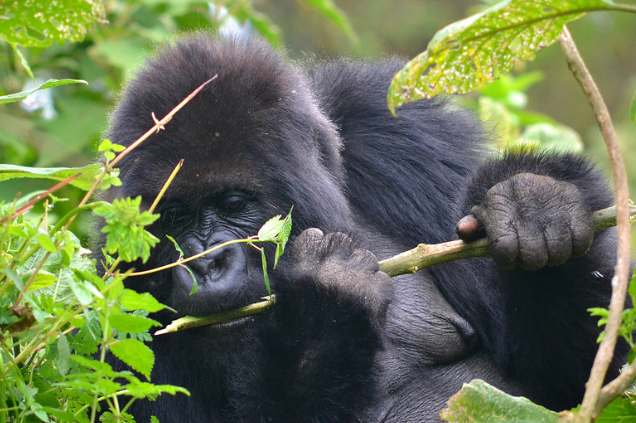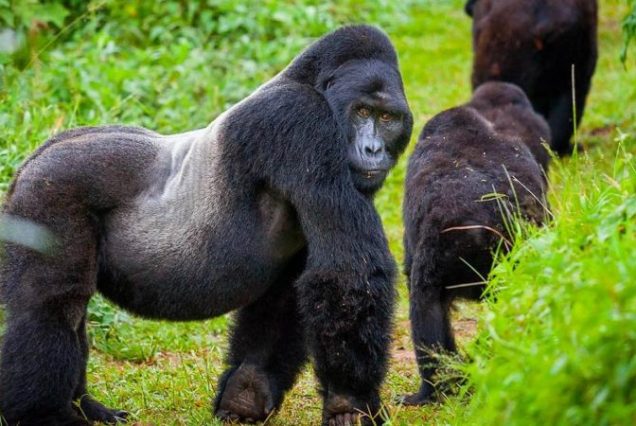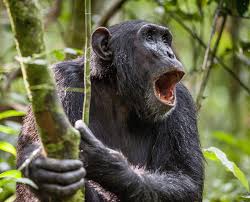Nyungwe National Park in the southwest of Rwanda covers around 1,019 square kilometers and settled on altitudes ranging between 1,600 meters to 2,950 meters above sea level. It was first established in 1933 but became an official national park in 2004. Nyungwe National Park is connected to Kibira National Park in Burundi and the tranquil Lake Kivu at the border with the Democratic Republic of Congo. This UNESCO World Heritage site is composed of a variety of habitats, including rainforest, bamboo, grassland, swamps and bogs. These habitats house numerous biodiversity, including at least 13 primate species, 85 mammal species, 32 amphibian species, over 300 bird species, 1,068 plant species, and 38 reptile species.
What to do in Nyungwe National Park
Explore Nyungwe National Park to have a unique tour experience where you can participate in the following activities,
Chimpanzee trekking tour
At Nyungwe National Park you can indulge in a thrilling chimpanzee trek, where you are provided the best opportunity of locating and spending time with a habituated chimpanzee group. To experience this amazing tour activity, you must be at the starting point at around 7:30 AM. After a briefing conducted by a ranger, you will be led into the forest to look for a habituated group of chimpanzees. This is a 2 to 5-hour hike and upon encountering the chimpanzee group, you will spend an hour in their presence. Ensure to take all the beautiful pictures you can before returning to the starting point. Engagement in this activity necessitates that your physical fitness is good and that you are at least 15 years old.
Canopy walk
Experience the superior canopy walk in a guided 2-kilometer hike that takes about 2 hours from the Uwinka Reception Center. This is mostly done on a walkway, which is a 160 meters long loop suspended at about 70 meters from the forest floor. While enjoying the canopy walk, you can also spot numerous birds, primates, mammals, butterflies and reptiles among others. The minimum age of experiencing the canopy walk is at least 6 years. Also ensure that you are physically fit and in good health for your canopy walking experience to be a success.
Birding tour
With over 260 bird species including at least 25 Albertine endemics in the evergreen canopies of Nyungwe National Park, enthusiastic birders will have a great time here. This guided tour experience is made even better because Nyungwe National Park has a variety of trails that includes Ngabwe trail, Igishigishigi trail, Kamiranzovu marsh trails and others. This bird paradise offers the perfect opportunity to spot the Grauer’s swamp warbler, Diederick cuckoo, blue-mantle chested flycatcher, northern double collared sunbird, grey parrot, brown-caped weaver, grey apalis, equatorial akalat, brown woodland warbler, Chinspot batis, bar-tailed trogon and African broadbill.
Colobus monkey trek
With 2 habituated colobus monkey troops available for a trekking tour in Nyungwe National Park, you will enjoy this tour experience. You can either trek the Uwinka troop to encounter 300 individual monkeys or the Gisakura troop with approximately 60 individuals. The guided colobus monkey trek commences with a briefing by the park ranger at the visitor’s center. A ranger guide will lead you into the dense forest to locate one of the habituated colobus monkey troops. You will encounter the troop and spend an hour with them. You will be allowed to watch them as you take excellent photos that you will take back home for memories. During the trekking tour, you can also spot numerous bird, insect and other primate species.
Photography
With the verdant vegetation in Nyungwe National Park, a tour there will ensure that you take photos of various plant, bird, mammal, primate and insect species among others. This activity is best done during the wet season when heavy rains lead to dense vegetation cover to providing lovely backdrops for the images. There are 1 primate species in Nyungwe National Park including chimpanzees, grey-cheeked mangabeys, blue monkeys, L’hoest’s monkeys, owl-faced monkeys, olive baboons, vervet monkeys and red-tailed monkeys. The wild animals in Nyungwe are composed of mainly bush pigs, bush elephants, bush buffalos, giant forest hog and duikers among others.
Best time to travel to Nyungwe National Park
The park gates of Nyungwe National Park are opened throughout the year. However, the dry season is the best time to explore Nyungwe National Park. The dry season is experienced during the months of June to September and December to February. This is a period when the forest is less dense and the walking trails are drier and easier to traverse. The rainfall is also minimal during this time; therefore, you will have continuous tours. However, this season usually coincides with the peak season, therefore you should book your trip in advance, especially chimpanzee trekking tours. If you are on a budget, you should however travel during the wet season to enjoy discounts on accommodation, transport and tour activities. This happens during March to May and from October to November.
How to travel to Nyungwe National Park
Visitors can travel to experience the lush jungles of Nyungwe National Park by road transport. With a distance that covers over 177 kilomters from Kigali to Nyungwe National Park, this smooth and scenic journey will take you 4-5 hours on a comfortable vehicle. You can also travel from Volcanoes National Park and Akagera National Park. From Volcanoes, you will drive southwards, where you will cover a road distance of around 261 kilometers and time 5-6 hours. From Akagera National Park, the scenic drive covers a total distance of about 255 kilometers and time of almost 6 hours. With us you can select to travel in either a 4X4 safari land cruiser or a minivan or even a saloon car, depending on your preference.
Packing list for a tour in Nyungwe National Park
As you plan to travel to Rwanda for a tour in Nyungwe National Park, your packing list should include the following essential items,
- Strong hiking shoes and gaiters
- Warm sweater
- Light rain jacket
- Head sock
- Sunglasses and suncream
- Lightweight long-sleeved shirts and long trousers
- Hat/cap
- Backpack
- Torch
- Basic first aid kit
- Personal medication
- Extra cash
- Camera or a smartphone
- A pair of binoculars
- Scarf
- Chimpanzee permit
- Birding checklist
- Insect repellent
